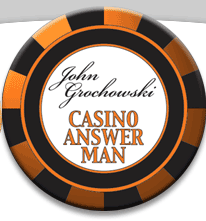It had been kind of a nondescript morning at the blackjack table--up a
little, down a little. Won all four hands when the dealer busted
after I split a pair of 8s, resplit and resplit again. Lost half
of it back on a double down on the next hand.
As I left the table, I was counting my $2.50 in winnings when a
fellow who had been playing at the same table approached.
"I have a question, but I didn't want to ask at the table," said
the 30-ish man, who introduced himself as Eric.
"I read a couple
of magazines about gambling, and sometimes I read about blackjack
on the Web. When they compare blackjack games, they emphasize
something called 'penetration.'
"I don't
see you write about that. But now that I have you here, tell me,
what is 'penetration,' anyway? Is it something I should be worrying
about?"
I told him I assumed he wasn't a card counter.
"No," he said. "Does that make a difference?"
It does. Penetration is important to card counters but not to
most players. It's the percentage of cards that is dealt before
the dealer reshuffles.
"Is it better for more cards to be dealt out?"
It is for a card counter. The more cards that are dealt out, the
more cards the counter sees. And the more cards the counter sees,
the more accurate the count.
In a common
six-deck game, penetration is said to be good if 1.25 decks or
less are cut out of play, average if 1.5 decks are cut and poor if 2
or more decks are left undealt.
"But you say that doesn't matter if you don't count cards?"
It matters a little, but in a different way. Penetration that a
counter would consider poor is actually better for an average
player or a basic strategy player.
"Really? Good penetration is a bad thing?" he chuckled. "Why?"
Because frequent shuffles slow down the game, and a slower game
is better for most players because it reduces their exposure to
the house edge.
Let's say you're at a
six-deck table with "poor" penetration, playing about 50 hands an
hour. Bet $10 per hand, and you risk $500 per hour. An average
player loses about 2 to 2.5 percent of that--an average loss of
$10 to $12.50 per hour. A basic strategy player loses about 0.5 percent
in the long run, although it can be a few tenths of a percent
more or less depending on house rules. That's an average loss of
$2.50 per hour.
Now let's say you move to a table
with good penetration and the speed steps up to 60 hands per
hour. The risk rises to $600 per hour, making average losses $12
to $15 per hour for an average player and $3 per hour for a basic
strategy player.
"Doesn't the risk increase for a
card counter, too? Does playing more hands offset the gain from
seeing more cards?"
Card counters want to play
more hands per hour. The faster the game, the more it benefits
whoever has the mathematical edge. Card counters--the handful of
good ones who have the knowledge, skill, discipline and bankroll
to make it work--actually gain a mathematical edge on the house.
Let a card counter with enough skill gain a 1.5 percent edge and
risk $500, and the average profit will be $7.50. With a risk of
$600, the average profit rises to $9.
"So a good game for a card counter isn't necessarily a good game for everyone else, and vice versa."
Right. Sometimes players' interests are at odds. A counter wants a
fast game, but it's better for the large majority of players to
have a slow one. A machine-shuffled game--but not a game with a
continuous shuffler that makes it impossible to count--suits
counters, but most players are better off with a hand-shuffled
game.
Playing head-to-head with the dealer, or with few other
players, speeds the game up for a counter, but playing at a full
table reduces exposure to the house edge for the masses.
"Should I go out of my way to look for a slower game?"
House rules are more important. If other rules are equal, the
house edge is lower with fewer decks. It's better if the dealer
stands on all 17s instead of hitting soft 17. We want to be able
to split and resplit pairs.
Often, the house won't let us resplit
Aces--it's a plus if we can. We want to be allowed to double
down on any first two cards--it's a negative if the house
restricts double downs to two-card totals of 9, 10 or 11, or even
just 10 or 11, as some do. We'd prefer to be permitted to double
down after splitting pairs--if we split a pair of 8s, then draw a
3 for an 11 on one hand, we usually want to double. And if surrender
is offered, that helps, too.
"You're
saying an ideal game uses one deck, the dealer stands on all 17s,
we can resplit pairs, double on any first two cards, double after
splits and surrender if we want to?"
No casino
would offer that game--a basic strategy player would have a nice
edge on the house. Then we'd want a fast game, just like the
counters.
